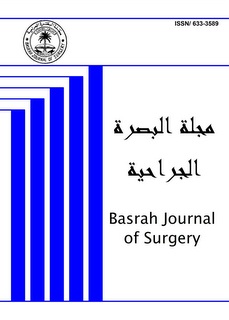Abstract
Coblation tonsillectomy is a new technique that was started in 1975, it involves passing a
radiofrequency bipolar electrical current through a medium of normal saline, resulting in a
plasma field of highly ionized particles which in turn break down intercellular bonds and thus
melt tissue at around 40º to 70ºC (in comparison with electrocautery which cuts tissues at
400ºC)
The aim of this study is to evaluate the benefit of coblation tonsillectomy over conventional
(cold steel) tonsillectomy, comparing tonsillectomy duration, blood loss during the surgery, and
the postoperative pain.
This prospective randomised single-blinded clinical trial was done on 90 patients. Patients
were divided into 2 equal groups; Group A: Underwent coblation tonsillectomy, and Group B
who underwent cold steel tonsillectomy. The study was performed in Al-Musawy Private
Hospital, Basrah Teaching Hospital, and Al-shifaa hospital, Basrah, Iraq. All surgeries were
done by the three authors in the period between February 2018 to August 2020. The
intraoperative bleeding, duration of surgery, and postoperative pain were evaluated and
compared for both groups.
The age range of the studied patients was 4–32 years, 52 were males and 38 were females.
The average duration of tonsillectomy procedure was 31.8 minutes in coblation tonsillectomy
(Group A), while the average duration in the cold steel tonsillectomy (Group B) was 25.8
minutes. The average operative blood loss in cold steel tonsillectomy was 31.5 ml while that in
coblation was 3.2 ml. Average postoperative pain in coblation group was (20.7± 6.15), while in
cold steel group was (27.5±7.27).
In conclusion, coblation tonsillectomy is effective and beneficial in decreasing the volume of
intraoperative blood loss but not for postoperative pain in comparison with conventional method,
in addition that it take more time to be completed.

